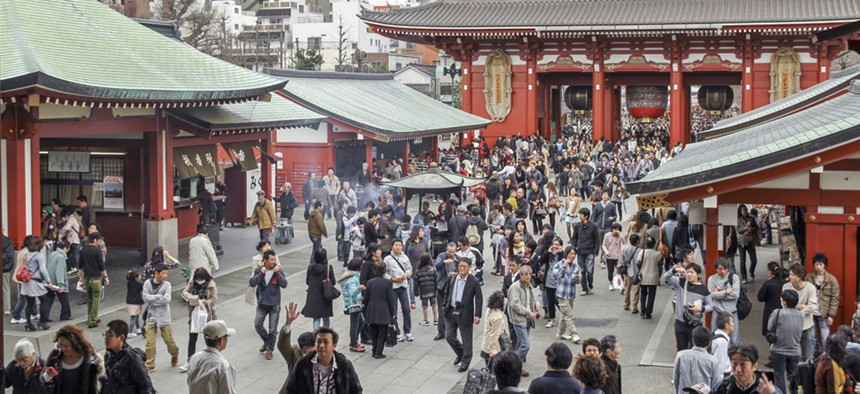
A crowd of Japanese people walk near a Buddhist temple in Tokyo in 2012. Cebas / Shutterstock.com
The Countries Where People Are the Most Emotionally Complex
Why cultures that value interdependence, like Japan, win at being deep
Think of the last piece of big news you got. How did you feel about it? Happy? Sad? Angry? Worried? Excited? Grateful? A little bit of all of the above? Experiencing multiple emotions at once may make it seem like you don’t actually know just how you feel about something—that you’re ambivalent, or indecisive, or wishy-washy. Psychologists would say it just means you’re emotionally complex. And according a new study published in the Journal of Personality and Social Psychology, emotional complexity varies a lot between countries.
There are two definitions of emotional complexity that researchers tend to use. One is called “emotional dialecticism,” which just means feeling positive and negative emotions at the same time. The other is “emotional differentiation,” which is when someone is able to separate out and describe the discrete emotions they’re feeling.
In the study, Igor Grossman and Alex Huynh of the University of Waterloo and Phoebe Ellsworth of the University of Michigan explored how emotional complexity manifests in different cultures. In a random sampling of 1.3 million English web pages from 10 different countries, they tracked how many times a positive emotion word appeared within two words of a negative emotion word. Sites from Malaysia, the Philippines, and Singapore all had significantly higher rates of mixed emotions than the texts from six other countries—the United States, Canada, Australia, the United Kingdom, Ireland, and New Zealand. South Africa came in somewhere in the middle of these groups.
Next, the researchers collected reports from college students in Russia, the U.S., Japan, India, Germany, and the U.K. about the emotions they’d felt during different experiences, like having a good interaction with a friend, or getting injured. Participants in Russia, India, and Japan were higher in both emotional dialecticism and emotional differentiation.
The researchers attributed the difference to the fact that people from Russia, India, and Japan also tend to place a higher value on interdependence, defined in the study as “attending to the wishes and concerns of others, focusing on the social context and the emotions of other people in their group, and seeing one’s emotions as originating through interactions with other people in one’s environment.” People from Western countries, on the other hand, are more likely to think that their emotions come from within themselves.
The researchers’ last step was to compare emotional complexity in American and Japanese people across a wider age range, using the same kinds of questions about recent experiences as they had with the college students. Again, the Japanese showed higher emotional complexity than the Americans.
Overall, “cultural differences in emotional complexity are robust and often sizable,” the study reads. “These cultural effects unfolded on a continuum across countries differing in interdependent social orientation.” Feeling more emotionally tied to other people, it seems, is linked to a higher level of emotional complexity.
And complex emotions, previous research has found, may be positively linked to a greater sense of well-being. In light of that, the researchers here suggest that “future work should examine whether training people to engage with their social environment in a more interdependent fashion may enhance their emotional complexity.”
NEXT STORY: You Can Go Sledding On Capitol Hill






